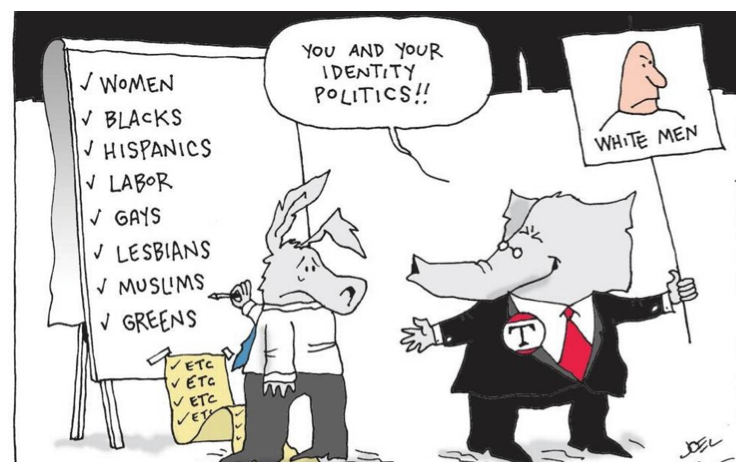CommentsCORRUPTION WATCH-Most Americans do not know that the U.S. is a republic, and most Americans do not care if the Republic lives or dies.
Even fewer recognize that the Constitution created a republic and not a democracy to secure the individual’s inalienable rights. That means the nation was founded on the rejection of Group Rights.
Both the GOP and the Dems Love Group Rights
The great danger of Group Rights is that once a party deceives a large number of voters by convincing them they belong to an endangered group, that party can count on their blind support. It’s kind of like rooting for the hometown team even when it cheats. The Declaration of Independence based the government’s legitimacy on its ability to secure each individual’s inalienable rights including Life, Liberty and the Pursuit of Happiness. The concept that inalienable rights were innate to all individuals was daring since the colonies were mired in Group Rights, i.e. the support of slavery.
Because slavery was the right of one group to own another group of human beings, Thomas Jefferson changed the customary triad of inalienable rights from “Life, Liberty and Property” to “Life, Liberty and pursuit of Happiness.” While we do not normally speak about how substituting the pursuit of “Happiness” for “Property” transformed our basic values, these three words may be the most important for the nation. Individuals may have their pursuit of happiness thwarted by being assigned to some group and then by have the government use that group status to impose liabilities upon them. Likewise, individuals may not be granted additional rights based on their ascriptive status.
A Departure from History
By recognizing that all individuals have unalienable rights, the Declaration of Independence represented a repudiation of previous political thought. The Declaration places sovereignty in neither a monarch nor the people. The legitimacy of the government flows from securing individuals’ inalienable rights. The Declaration recognizes no right to rebel against the government just because someone wants more porridge. Changing the government is permitted only if the government ceases to secure inalienable rights.
Group Rights Are Incompatible with Inalienable Rights
Although it took many more decades and a horrible war, our nation was able to rid itself of de jure slavery. But the 13thAmendment did not mean that the populace gave up its love for Group Rights. The South soon established Group Rights for whites by instituting segregation. No group that cherishes individual inalienable rights could sanction the re-legalization of Group Rights. Thus, there is no denying that by adopting segregation, Southerners rejected the nation’s founding premise of inalienable individual rights.
In 1896, the U.S. Supreme Court in Plessy v Ferguson(1896) 163 U.S. 537 recognized Group Rights by ignoring the Constitution’s purpose to “secure the blessings of Liberty.” Plessy raised the question, which remains unanswered today, what do we do when the Supreme Court issues an opinion which is unconstitutional on its face? A white child could not go to a Negro school; a white person could not share a train ride with a Negro friend. Blacks could not be segregated from whites without also segregating whites from Blacks. The U.S. Supreme Court denied all citizens the inalienable right to decide for themselves whether they wanted to associate with people of different races; instead, it gave that right to the government.
In 1954, in Brown v Board of Education347 U.S. 483 (1954), the U.S. Supreme Court had the opportunity to reject Plessy’s denial of the inalienable right of Liberty, but it opted to follow Plessy by ignoring that segregation was a deprivation of Liberty. In so doing, the U.S. Supreme court deprived both whites and Blacks of their individual inalienable rights to Liberty.
Although Brown v Board of Educationended segregation, its decision was based on Group Rights. Because some sociologists found that Blacks did not do well in separate schools, segregated schools were decided to be unconstitutional. That decision meant that civil rights were based upon statistical measurements of how well groups of Negro students were performing and that translated into a determination of how many students of different races were sitting next to each other in school. In Brown, the Supreme Court should have ruled: “segregation is a deprivation of an individual’s inalienable right of Liberty.”
The Intersection of Media and Group Rights
The other champion of Group Rights is the media. The right-wing media caters to the fears of whites and the left-wing media like the (former?) LA Timespromotes Identity Politics. It’s like Jeffries v Johnsondeja vu. Conflict, bleeding and racism sell newspapers. Traditional newspapers are losing money but political prize fights earn revenue.
With the upcoming Supreme Court nomination, the media has no room for stories on the inalienable rights of individual human beings. That does not make good copy. Will any newspaper report that Roe v Wadeis based on the 14thAmendment’s personal liberty of which the right of privacy is one reflection? Americans are still enthralled by the dichotomous struggle between the Saved v the Damned, and they have no room for the complexities of the Republic which was designed to protect the individual’s inalienable rights of Life, Liberty and the Pursuit of Happiness.
(Richard Lee Abrams is a Los Angeles attorney and a CityWatch contributor. He can be reached at: [email protected]. Abrams’ views are his own and do not necessarily reflect the views of CityWatch.) Edited for CityWatch by Linda Abrams.
















